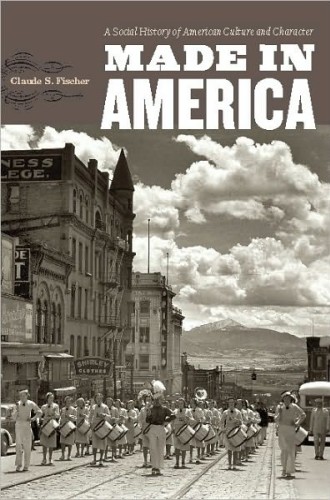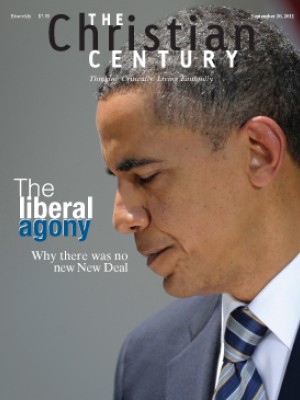Portrait of a nation
College and university professors know all about campuswide efforts to overhaul the general curriculum. Exhausting as such enterprises are, the conversations and arguments about what courses students should be required to take are illuminating. On my own campus, recent curricular debates made clear that arguments about the importance of history as a mode of thinking and inquiry were not sufficient to preserve its place in the academic program. For some of my colleagues outside the discipline—and particularly colleagues outside the humanities—history's value in the liberal arts depends on historians providing students with particular and common content about the past. That is, our role is to give students the historical narrative. Of course, my colleagues were right to suspect that we historians have not been doing this.
The distinguished University of California sociologist Claude Fischer is also unhappy with historians' failure to provide the grand narrative—in this case the grand narrative of American history. But instead of waiting for recalcitrant historians to tie up the "loose threads that comprise the study of American social history," Fischer provides his own metanarrative, neatly laid out in the introduction. Fischer is convinced that there is an American national character that makes America exceptional and that its central feature is voluntarism, defined here as something like individualistic collegiality: we are "sovereign individuals," but we love to be in groups that we can leave when we so choose.
Read our latest issue or browse back issues.
This character, which unites us as a people, had its origins among white Protestants in the Northeast, and the white middle-class "lives and promulgates" this "distinctive and dominant character of the society" more than any other sector. But thanks to the "availability and expansion of material security and comfort," the mainstream has widened over time so that "more people could participate in that distinctive culture more fully and could become 'more American.'" In sum: "There is an American cultural center; its assimilative pull is powerful; and it is distinctive—or 'exceptional.' The historical record speaks."
Made in America is eerily reminiscent of the "consensus history" that dominated the discipline in the two decades after World War II, when historians such as Daniel Boorstin, Louis Hartz, Richard Hofstadter and David Potter argued that Americans were united in some essential way—often by character or common liberal commitments—that made the nation exceptional and that made possible a grand narrative of American history marked by a fundamental consensus. In the wake of the conflict-ridden 1960s and 1970s such an approach to U.S. history began to look badly flawed—or worse.
Over the past four decades many or most American historians, and especially those trained in social history, have given up on defining a national character and have abandoned the quest for the grand narrative. Given the great diversity—racial, gender, economic, religious, geographical and more—of American life, how could one possibly imagine that there is a national character? How could one possibly construct a plausible grand narrative that not only captures all this diversity, but does not unfairly privilege one group over another?
The questions raised about the consensus history of the 1950s can be applied with similar vigor to Made in America. The riotous social and cultural diversity and the deep-seated, passionate and fundamental conflicts that have marked our history are muted in Fischer's story. His claims about national character and a grand narrative are more assumed than verified; indeed, to make such claims is to move away from the notion of contingency that is at the heart of the historical discipline. Fischer's project has a strong air of historical inevitability, even though he strongly denies that this is his intention.
Despite all this, Made in America is an impressive intellectual achievement, and the book is very much worth reading. One reason it is so impressive is precisely that it is so ambitious. Fischer takes the long view of American history, and in doing so he sees much that those of us who are confined to smaller spaces and shorter time frames do not see.
More than this, he makes remarkable use of the work of social historians (yes, those same historians who adamantly eschew metanarratives), writing that they "have in recent decades mined rich veins of archives, bringing to the surface stories of how Americans of the past really lived." His 102 pages of endnotes are worth the price of the book.
Fischer uses his findings—organized by the themes of security, goods, groups, public places and mentality—to debunk the notion that there is a "mythic past," a golden age in which Americans were much more religious, much less violent, much happier in their work, much less inclined to move to new places and much more compassionate toward the needy. To the contrary, Fischer contends, over the past 100 to 150 years "we" have actually become more settled, more likely to attend church, more likely to live lives untainted by violence, more fulfilled by our work and more sympathetic to the poor.
Such a sweeping argument begs for substantive challenges. To mention one: the notion that Americans have become less violent over time would seem to be countered by Randolph Roth's American Homicide, which presents strong evidence that the United States used to be much less murderous than it is today. Nevertheless, Fischer makes a strong historical case against the sense of national decline that currently afflicts many Americans (liberals as well as conservatives). "In myth," Fischer argues, the past is "seemingly unproblematic," but the truth is that "over the centuries, American life became much less precarious" as the "threat of arbitrary and unpredictable calamities from illness or injury or economic misfortune abated."
In explaining the growth of physical and material security over the course of American history, Fischer repeatedly emphasizes two factors: "economic growth and public policy." The latter is very much a 20th-century story, with Progressivism and, especially, the New Deal in the 1930s and the gradual expansion of the social safety net over the next three decades. To make his point that government action has lengthened and improved our lives, Fischer presents an impressive list of policies and programs, including public sanitation, building codes, food regulation, vaccination programs, pest eradication, consumer product regulations, nutrition education, direct relief and food subsidies for the poor, financial regulation, labor laws, disability insurance, bank deposit insurance, unemployment insurance and, most significant, Social Security and Medicare.
For Fischer, the "variety of government programs" that "virtually eliminated starvation and radically reduced poverty" are clear indicators that sympathy for the destitute has been increasing, not decreasing, over time. Tony Judt, in his masterful Ill Fares the Land, made a similar claim, asserting that thanks to government actions, "from the late 19th century until the 1970s the advanced societies of the West" became progressively "less unequal." But then Judt went on to point out that over the past 30 years Western nations—most dramatically the United States—have "thrown all this away," thanks to an "unwavering . . . commitment to the unraveling of decades of social legislation and economic oversight." This "economic disadvantage for the overwhelming majority" of Americans has translated into (as Judt documented in a series of dramatic and depressing graphs) poor health, mental illness, reduced life expectancy, criminality, reduced social mobility and missed educational opportunity.
Unlike Judt, Fischer says little about the relentless ideological and political assault on the welfare state over the past three decades. But he does acknowledge that the growing educational and wealth inequality in these years has had a deleterious effect on Americans on the lower rungs of the socioeconomic ladder: "In the last few decades . . . social opportunities constricted for average Americans and marginalized Americans became more marginalized. History is not a steady progression, so this stall may be a passing era. Or not." Of course, if this three-decade retrenchment of the welfare state is not simply a temporary historical "stall," then it would seem that, by Fischer's own standards, there really was a golden age of compassion in America, from 1900 to 1970. And if this is the case, there is good reason for Americans to feel a sense of decline because it may be true that comfortable Americans have become increasingly indifferent to the needy.
If our history is really a matter of continuities, if there really is something essential to being an American, then perhaps the early- and mid-20th-century concern for the "least of these" was an anomaly in the history of the American bourgeois character. Perhaps we should give the last word to Alexis de Tocqueville: "As one digs deeper into the national character of the Americans, one sees that they have sought the value of everything in the world only in the answer to this single question: how much money will it bring in?"







